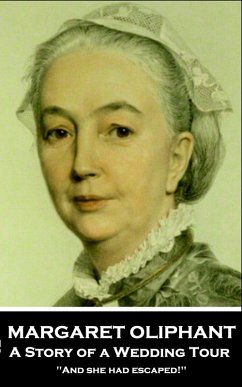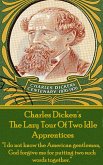Margaret Oliphant Wilson was born on 4th April 1828 in East Lothian in Scotland but spent her childhood in Midlothian, Glasgow and Liverpool.
She wrote from a young age and in 1849 had her first novel about the Scottish Free Church movement, a cause her parents sympathized with, published. Her next, 'Caleb Field', a couple of years later, led to a lifelong association with Blackwood Magazine to which she contributed more than a 100 articles and reviews.
In May 1852, she married her cousin, Frank Wilson Oliphant, an artist working in stained glass, and settled in Camden, London. Together they had six children but tragically three died in infancy.
Unfortunately, Frank developed tuberculosis and so they moved in January 1859 to Florence, and then south to Rome, where he died. Margaret was devastated and was left with the burden of supporting herself and their three children.
She returned to England and with her prolific literary work increased her commercial reputation and the size of her reading audience. Margaret worked tirelessly to sustain her popularity with her supernatural tales and historical fiction.
Despite the short time she lived in Scotland, much of her writing displays strong connections in terms of settings, themes and its oral tradition.
Margaret was admired for her range of supernatural tales, which resonated with her fascination for the afterlife and given her own experience, provided a sense of comfort to those grieving.
She also wrote about the injustice faced by women and evidenced here by her strong tale:- 'A Story of a Wedding Tour' describing a young bride deserting her husband for a life that would give her a chance to express her own desires.
Unfortunately, her family life continued to be fraught with tragedies due to the further death of her one remaining daughter, financial ruin for her alcoholic brother and unfulfilled ambitions for her two sons followed by their deaths in 1890 and 1894. She had settled in Windsor near Eton where her sons had been educated in 1866 and was buried there following her death on 25th June, 1897.
Hinweis: Dieser Artikel kann nur an eine deutsche Lieferadresse ausgeliefert werden.
She wrote from a young age and in 1849 had her first novel about the Scottish Free Church movement, a cause her parents sympathized with, published. Her next, 'Caleb Field', a couple of years later, led to a lifelong association with Blackwood Magazine to which she contributed more than a 100 articles and reviews.
In May 1852, she married her cousin, Frank Wilson Oliphant, an artist working in stained glass, and settled in Camden, London. Together they had six children but tragically three died in infancy.
Unfortunately, Frank developed tuberculosis and so they moved in January 1859 to Florence, and then south to Rome, where he died. Margaret was devastated and was left with the burden of supporting herself and their three children.
She returned to England and with her prolific literary work increased her commercial reputation and the size of her reading audience. Margaret worked tirelessly to sustain her popularity with her supernatural tales and historical fiction.
Despite the short time she lived in Scotland, much of her writing displays strong connections in terms of settings, themes and its oral tradition.
Margaret was admired for her range of supernatural tales, which resonated with her fascination for the afterlife and given her own experience, provided a sense of comfort to those grieving.
She also wrote about the injustice faced by women and evidenced here by her strong tale:- 'A Story of a Wedding Tour' describing a young bride deserting her husband for a life that would give her a chance to express her own desires.
Unfortunately, her family life continued to be fraught with tragedies due to the further death of her one remaining daughter, financial ruin for her alcoholic brother and unfulfilled ambitions for her two sons followed by their deaths in 1890 and 1894. She had settled in Windsor near Eton where her sons had been educated in 1866 and was buried there following her death on 25th June, 1897.
Dieser Download kann aus rechtlichen Gründen nur mit Rechnungsadresse in D ausgeliefert werden.
Hinweis: Dieser Artikel kann nur an eine deutsche Lieferadresse ausgeliefert werden.









